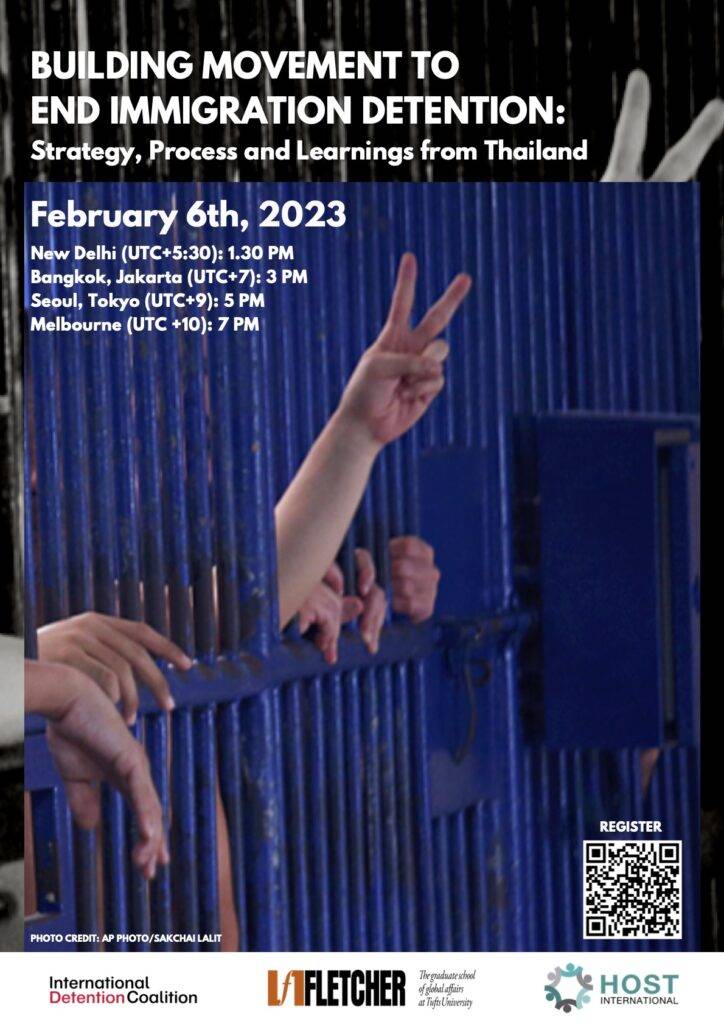Written by Chawaratt (Mic) Chawarangkul, IDC Southeast Asia Programme Manager
On 6th February 2023, International Detention Coalition (IDC), HOST International, and Fletcher School of Global Affairs International Law Practicum, at Tufts University, co-convened a webinar on Building a Movement to End Immigration Detention: Strategy, Process and Learnings from Thailand.
The use of immigration detention remains prevalent in the Asia Pacific region. It is used in many countries in an arbitrary and discriminatory manner, and without necessary safeguards such as legal limits on the period of detention and guarantee of a person’s procedural right to challenge immigration detention decisions. Migrant children and other migrants in vulnerable situations, such as pregnant women, older persons, persons with disabilities, LGBTQI+ individuals and stateless persons, continue to be held in immigration detention across the region. At the same time, promising practices like alternatives to immigration detention (ATD) are emerging in the region, especially for children, and there is momentum in some countries for reducing and taking steps toward ending child immigration detention specifically.
Thailand is one such country where ATD has emerged as a promising practice. Thailand is situated in the centre of Mainland Southeast Asia and has a long history as both a regional hub for migration and as a host to refugee communities. Due in part to the strength of its economy, Thailand has historically been an important destination for migrants, hosting an estimated 4.9 million non-Thai residents in 2018, up from 3.7 million in 2014.
Prior to 2016, Thailand had a record of detaining thousands of refugee and migrant children annually. However, Thailand has since emerged as a regional and global champion on ATD for children. It has taken important and concrete steps toward ending immigration detention for children and expanding ATD to other migrants in vulnerable situations.
The webinar allowed ATD practitioners and partners in the region to explore some of the key factors that led to these key changes in Thailand. We provided an overview of historical events and unpacked some of the strategies and ways in which civil society, Thailand’s representatives to the Asia Intergovernmental Commission on Human Rights, the Thai National Human Rights Commission, UN agencies, academics, the diplomat community, and other stakeholders collaborated to put child immigration detention and ATD on the reform agenda.
The webinar also sought to identify some of the elements that make this movement effective, drawing lessons from the extensive expertise of civil society in Thailand, and give participants space for seeking ideas from civil society in Thailand and reflect on how learnings from Thailand can be applied in other contexts within the Asia Pacific region.
The webinar drew heavily from a report prepared by the Fletcher School of Global Affairs International Law Practicum, entitled ‘Best Interest of the Child: Ending Immigration Detention of Children in Thailand’ which was submitted to the United Nations Special Representative to the Secretary General on Violence Against Children. The report, completed in May 2022, documented how stakeholders, within Thailand and globally, collaborated to build a movement to end immigration detention beginning with children as a gateway to expanding ATD for other migrants in vulnerable situations.
Key learnings from the webinar
- Change takes time, but it is possible and requires long-term strategy and long-term investment;
- While the movement is at the national level, it is critical to connect national, regional and global efforts. Based on the case in Thailand, this multi-level collaboration enhanced change on the ground;
- Multi-stakeholder approaches require skilled coordination, and a joint and clear agenda and theory of change;
- Decision-makers can be more open to engagement when advocacy is solutions-focused;
- A whole of government and a whole of society approach can pave the way to collaborative resolutions.
- Local actors are key to affecting change and must be the advocacy leaders
- ‘One size doesn’t fit all’; however, it’s important to find examples that can inspire lessons for how initiatives can be localised.
